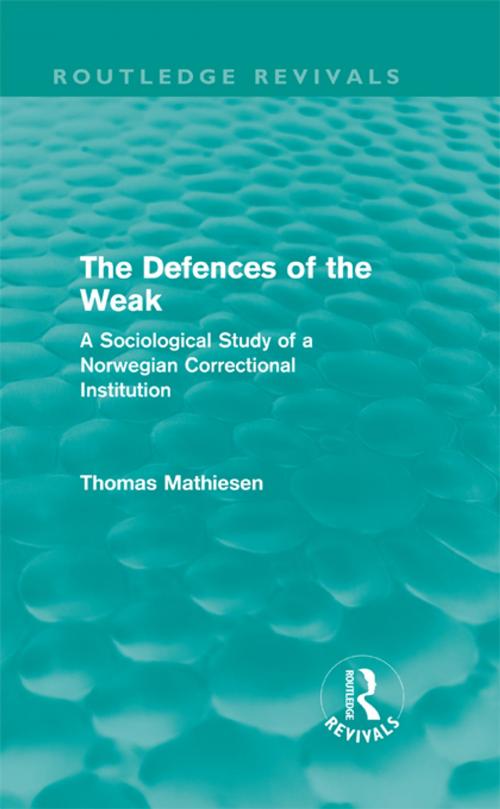The Defences of the Weak (Routledge Revivals)
A Sociological Study of a Norwegian Correctional Institution
Nonfiction, Social & Cultural Studies, Social Science, Sociology| Author: | Thomas Mathiesen | ISBN: | 9781136284090 |
| Publisher: | Taylor and Francis | Publication: | November 12, 2012 |
| Imprint: | Routledge | Language: | English |
| Author: | Thomas Mathiesen |
| ISBN: | 9781136284090 |
| Publisher: | Taylor and Francis |
| Publication: | November 12, 2012 |
| Imprint: | Routledge |
| Language: | English |
This is a sociological study of a Norwegian penal institution. The author spent two years in the institution, observing and interviewing inmates and staff, the target being to learn the extent to which American prisons fit with prison life in a different culture. He gives a fascinating answer to the question: Norwegian prisons were, at the time of the study, miles away from their American counterparts. The conflicts between prison officers and inmates were certainly there, but they took a very different form. Rather than engaging in deviant practices and norms, emphasising more or less solidary opposition against the staff, the Norwegian prisoners criticised the staff and the prison fiercely on the basis of their own norms; rather than engaging in deviance, they turned the common practises and norms of Norwegian society against the staff, engaging in a kind of moral surveillance of those in power. He coined the phrase of "censoriousness" to this approach from the "bottom" of the prison. Mathiesen spells out the major causes of this different approach, from characteristics of this particular prison to broader social forces.
This is a sociological study of a Norwegian penal institution. The author spent two years in the institution, observing and interviewing inmates and staff, the target being to learn the extent to which American prisons fit with prison life in a different culture. He gives a fascinating answer to the question: Norwegian prisons were, at the time of the study, miles away from their American counterparts. The conflicts between prison officers and inmates were certainly there, but they took a very different form. Rather than engaging in deviant practices and norms, emphasising more or less solidary opposition against the staff, the Norwegian prisoners criticised the staff and the prison fiercely on the basis of their own norms; rather than engaging in deviance, they turned the common practises and norms of Norwegian society against the staff, engaging in a kind of moral surveillance of those in power. He coined the phrase of "censoriousness" to this approach from the "bottom" of the prison. Mathiesen spells out the major causes of this different approach, from characteristics of this particular prison to broader social forces.















